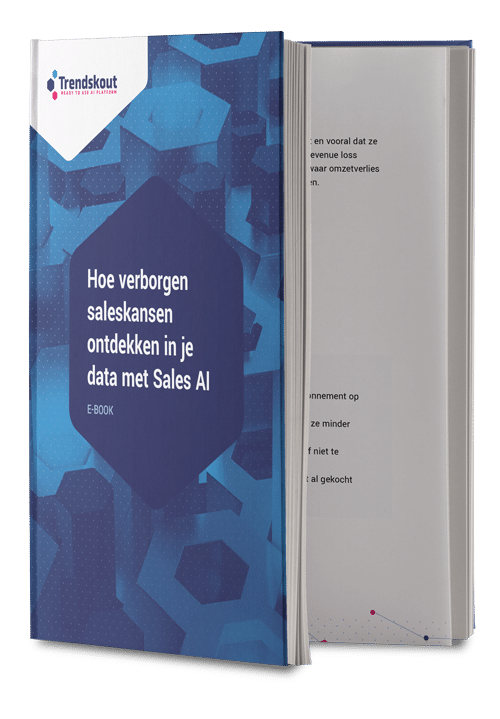Companies that are preparing for and embracing the changes that AI will bring, we love it. But what about AI's penetration into the world of sales? Sales has traditionally been a man-to-man affair, but technologies such as artificial intelligence are causing experienced salespeople to rethink the balance between man and machine. In fact, automation is already affecting sales and its influence will only increase.
Sales directors and sales managers looking for ways to transform the way they work should look to artificial intelligence to find solutions. The good news is that you can start planning for those innovations now. So, what does the short-term future of AI for sales people look like, and how can you start using AI to beat the competition? We are going to find out!

What is artificial intelligence in sales?
Artificial intelligence in sales is the use of modern technologies with computational power to help cognitive tasks perform like humans or even more efficiently. There are many smart technologies in artificial intelligence for sales that will have a direct impact on your sales career. If you use AI for sales efficiently, your performance will improve by a significant margin. The techniques artificial intelligence uses for sales predict which leads are most likely to become customers. AI will help your business track sales performance and optimise product and deal pricing based on market trends.
The need for automation in sales
Sales has generally been slow to adapt to AI and automation. Marketers have been much quicker to jump on the technological evolutions. For example, language software with a machine learning background is helping publishers increase clicks on their titles. There is the example of JPMorgan Chase in the US where they have an improvement of 450%.
That is just one example. To stay ahead of the competition in today's sales world, sales teams need to start using AI much more. The Salesforce State of Sales report notes that only 46% of salespeople have access to customer and prospect data insights (something 85% of salespeople say helps them perform better).

This difference in technology-friendliness between revenue-generating departments is no surprise. Sales and marketing have always had different ways of approaching the same problems. This has led to the difficulty of strategically aligning both teams. But with so many technologies transforming the landscape, it's time for sales to throw itself into the fray. Gartner research predicts that 70% of customer experiences over the next three years will include some form of machine-learning component. The first sales teams to adopt AI and pioneer its use will have a huge advantage in the near future.
What can AI do for your company's sales?
Companies that want to continue to grow and stand up in that tough entrepreneurial world will no longer be able to do without AI. Here's how your sales will benefit from the introduction of artificial intelligence:
AI gives room to develop your business strategy
AI for sales helps to enable you to focus on creating strategies for generating more leads. Artificial intelligence will ease the monotonous tasks of salespeople through machine learning programmes. This will leave you with more time to devise strategies. With AI, you will perform the following tasks effortlessly:
- Consolidating data.
- Sharpening customer profiles.
- Creating content that shows leads the way to the next step.
- Sending the next-step content to leads.
With these tasks off your hands, you have more time to develop strategies that improve the customer experience leading to increased profit realisation.
AI facilitates prospecting
Connecting all the information you have: that takes time. Qualifying leads, following up on them to build and maintain a business relationship is just as time-consuming. When you use AI for sales, the technologies take on these tasks and deliver results quickly. Consequently, leads increase because AI helps you reach specific and targeted prospects.
Costs fall significantly
When you use artificial intelligence, you automate most low-level sales activities. The result is that the cost of these activities falls because AI tools for sales do the challenging work for you. Your time and energy can be better spent on making more significant profits. Think about get more out of your existing customers, less time wasted scrolling eternally through reports that hardly anyone understandsetc
Easier up-selling and cross-selling
With artificial intelligence, salespeople are better able to identify prospects who are likely to buy from them. Salespeople also use AI to determine when they are most likely to sell. The AI algorithms choose prospects that are likely to subscribe to solutions from your company or business. By collecting all the data about a customer and their relationship to the products, an AI system can also make faster and more appropriate recommendations. By fine-tuning the recommendation, you significantly increase the chances of up-selling and cross-selling through AI.
The potential future of AI for sales
Ai is really not a thing of the future. Today, there are already opportunities to integrate the technology into modern sales activities. AI is already being used in many companies, and it is slowly being adopted by the sales departments. Almost 90% of the entrepreneurs using AI say they are already using or plan to use AI specifically for, among other things, sales forecasting.
In Flanders and the Netherlands, very few sales teams are still using AI. We see an increase year after year. And this will continue for some time. AI, however, has its limits.
Salespeople, especially at the enterprise level, must understand their company, their product, their market and their buyer exceptionally well. They must be able to retrieve data from multiple sources, interpret it, intuitively assess the needs of others, communicate abstract concepts intelligently and make decisions when they are needed - often with little information available. It is unlikely that this can be fully automated in the short term.
This brings us to the most common fear when talking about AI. Will it take away all our jobs? In short: no, not for the time being. But not all jobs are completely safe. Jobs in sales that require only basic functional knowledge of the product, problem-solving skills or written or oral communication are likely to be replaced by AI in the next decade or so. All sales activities require some basic communication, and basic communication has increasingly come into the hands of machines. What started as door-to-door sales has moved to electronic communication. Websites and chatbots are taking over, and will continue to do so, especially as AI's basic language skills improve.
Think how this will affect the market in the years to come. The sales functions of the near future will shift to things AI still struggles with: strategic conversations, complex problem solving and human relations. The majority of sales functions will focus on human relationships and connections. They will focus on situations where people are sceptical about technology, or where the sales force is more complex than just providing a widget. If your job in sales is largely based on easy-to-answer, back-and-forth conversations or functional planning, expect it to change dramatically - or even disappear altogether - in the next two decades. Careers in sales of the future will require a much deeper understanding of customers and market dynamics than before.
Wondering how our platform can help boost sales activities? Book a demo now! We show concrete examples using use cases relevant to your business.

